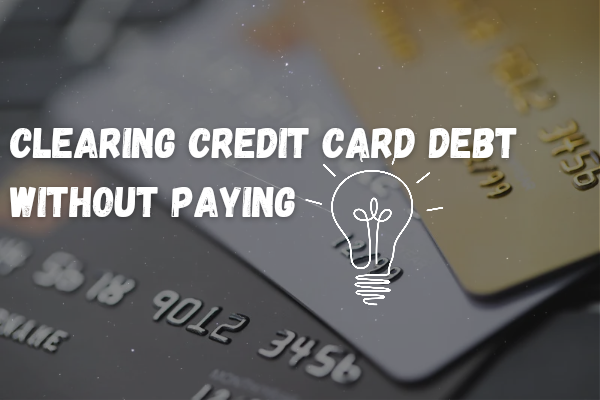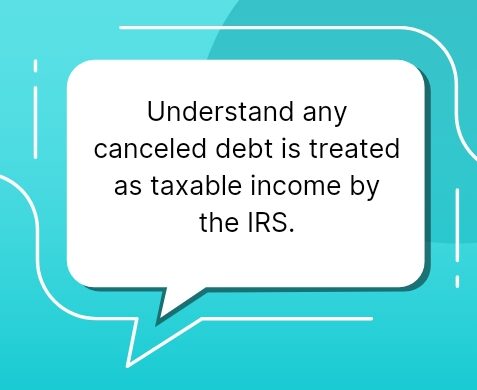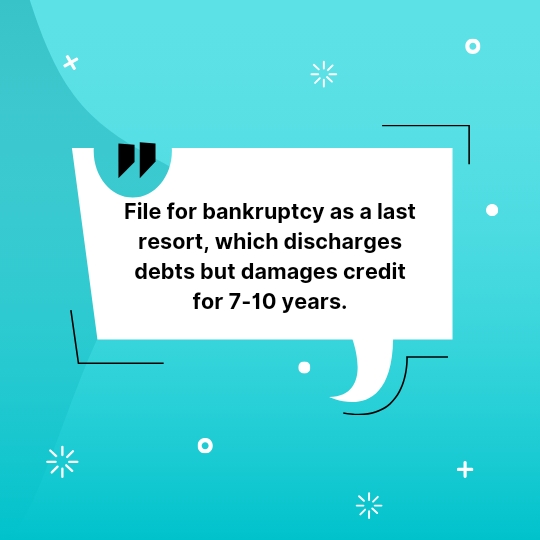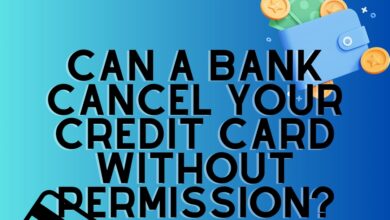How Can I Get Rid of My Credit Card Debt Without Paying?

I had gone for a house party recently and my friends noticed how gloomy I was looking and they asked what the problem was.
Had to explain to them about how choking paying off my credit card account debt has been lately since I had a little setback in my finances. I told them how I desperately needed to sort it out.
And One person brought to my notice that I can actually get rid of my debt and offered me a way out.
Now Come with me, let’s find out how.
It is not a novelty that Credit card debt plagues millions of consumers as balances and interest costs spiral out of our control.
When our money runs short each month, the idea of eliminating the debt without actually paying them off may seem like the perfect solution.
However, legally ditching legit credit card debt rarely proves possible without you facing consequences. Still, some strategic fallback options exist to help us tackle balances due when we’re unable to cover minimum payments month after month.
Come, Let’s investigate some potential options to technically wipe away our credit card obligations without paying in full and in addition to that, this article provides important pitfalls to understand when seeking an easy way out.
How Much Should I Pay on My Credit Card Each Month?
Table of Contents
Attempt Direct Negotiation
Before you consider more drastic measures, you need to first of all approach your credit issuer directly, explaining the financial hardship you currently face that prevents the debt payments in hopes of obtaining internal relief from them.

While you are at that, be candid yet solutions-oriented by saying something like, :
“I owe {balance amount} carrying over each month gaining interest. I struggle affording groceries and rent due to loss of work. Is there any way to reduce or defer monthly payments until I secure income again?”
Your credit card account Issuers may decide to temporarily lower interest rates, waive late fees unconditionally for 60-90 days, allow reduced payments for 6 months reaching 35%↓ original minimums, or even forgive 20-30% of total balances immediately if you indicate true long term loyalty with them.
But If they refuse internal concessions , you should then negotiate firmly by mentioning escalation plans implying your next steps like legal mediation or credit counseling service enrollment.
This puts them at a tight corner, because Issuers prefer compromising versus losing your business and inheriting defaults.
Be aware that extended payment plans still require eventual payoff of amounts waived conditionally upfront.
It is advisable to get any compromise promises in writing before resuming minimum payments at newly reduced levels or rates.
What is the Highest Credit Card Interest Rate?
Leverage Debt Management Plans
It is profitable to also Seek outside help if you intend to manage unaffordable debts. Certified credit counseling services provide you with customized debt management plans consolidating multiple credit payments into one lower fixed monthly amount distributed on your behalf until achieving payoff, isn’t that just wonderful.

They provide Plans lasting 4-5 years on average that can yield the following:
- Reductions payment of debt up to 50%
- You can get a Waived late and over limit fees
- A Lower creditor interest rates is also available
- Drawbacks include enrollment fees reaching ~8% of total debt and mandatory account closures stopping usage while enrolled. Plus your potential score hits still linger from program mentions on your credit file even after completing payoffs.
So you Compare terms across multiple nonprofit credit counseling companies before committing to the one that best suits your needs.
If it is approved, you need to cooperate fully with new payment terms and rules to get the concessions desired so your debts can ultimately dissolve, just like we hope for.
Initiate Balance Transfers
Another option is Balance transfer credit cards offering 12-21 month 0% introductory rates allowing moving high interest credit card balances onto a new account to help you pause interest accrual temporarily.
This delays out of pocket costs for over a year while you establish better payment footing slowly.
You need to ensure that making payments during the 0% term is sufficient to completely eliminate transferred debts before rates jump back to double digit levels afterwards.
And you have to abstain from any fresh purchases using the balance transfer card itself to avoid interest fees on new activity.
While this is technically not forgiveness, pausing interest accumulation by shifting balances to a 0% interest account allows your payments to focus on reducing principal balances owed over the short term promo period.
Can a Closed Credit Card Be Reopened?
File Bankruptcy as Last Resort
Under Chapter 7 bankruptcy, qualifying consumers can liquidate eligible assets using the proceeds to repay outstanding debts at lowered compromise levels ordered by the court.
This dissolution option helps to legally discharge remaining unpaid credit balances after asset seizure payoffs occur.

However, note that bankruptcies ruin credit reputations for 7-10 years hampering future loan approvals. In addition to that, very low income individuals often get Chapter 7 rejection sent to structured debt repayment plans instead shedding nothing.
Though Considering bankruptcy should be the absolute last resort because it impacts credit futures the longest. You should feel free to Meet with attorneys to discuss feasibility first before opting for it.
Often better options exist beforehand.
While you appeal for a debt elimination promise without direct payments, know that bankruptcy inflicts lasting disadvantages that undermine credit access and borrowing capacities for nearly a decade, so this is an option we need to be careful of .
Understand Tax Implications
Again while the idea of dodging legitimate credit card debts sounds enticing and irresistible, keep it in mind that possible tax consequences associated with balance forgiveness as shown below:
- Creditors may issue 1099-C tax forms for discharged debts not repaid
- IRS counts canceled balances as taxable income spikes that tax year
- You Potentially owe income tax on tens of thousands in written off credit card balances
So unless you qualify under insolvency exclusions, inform the credit card company and IRS immediately following any creditor negotiated debt removal to avoid massive tax bills later!
Warning Signs of Credit Card Relief Scams
I can imagine how desperate such situation can put one but Beware of shady business offers promising debt payoff assistance or balance eliminations for an upfront fee, they might only leverage your money unlawfully or trash credit standing through unethical techniques like:
- When they Charge for available free credit counseling assistance
- Suggest Filing false disputes under your name against legitimate debts
- Or Flood credit reports illegally with hardship annotations preventing approvals
- Suggesting for you to intentionally default on payments to prompt settlements
So it’s advisable to Avoid such scams suggesting illegal methods that ultimately backfire you with lawsuits, garnishments, or destroyed credit.
Using Transparent credit counseling programs are the safest options assisting those truly overwhelmed but committed to ethical debt repayment.
You can watch this video:
Conclusion
We have seen that While no easy way out of ditching legit credit card debt without payment consequences exists, flexible creditors provide hardship options on a case based on how loyal the customer is.
This gives room for temporary payment delays or reductions sufficient to help you regroup finances and resume aggressive paydown later on when your finances become balanced.
Alternatively, accredited counseling service plans consolidate multiple debts with lower fixed payments alongside reduced interest rates for the debt duration. However promised, outright debt dismissal invites taxes or credit damage. Ultimately commitment to good faith repayment agreements paves the most practical paths toward becoming debt free long term.



